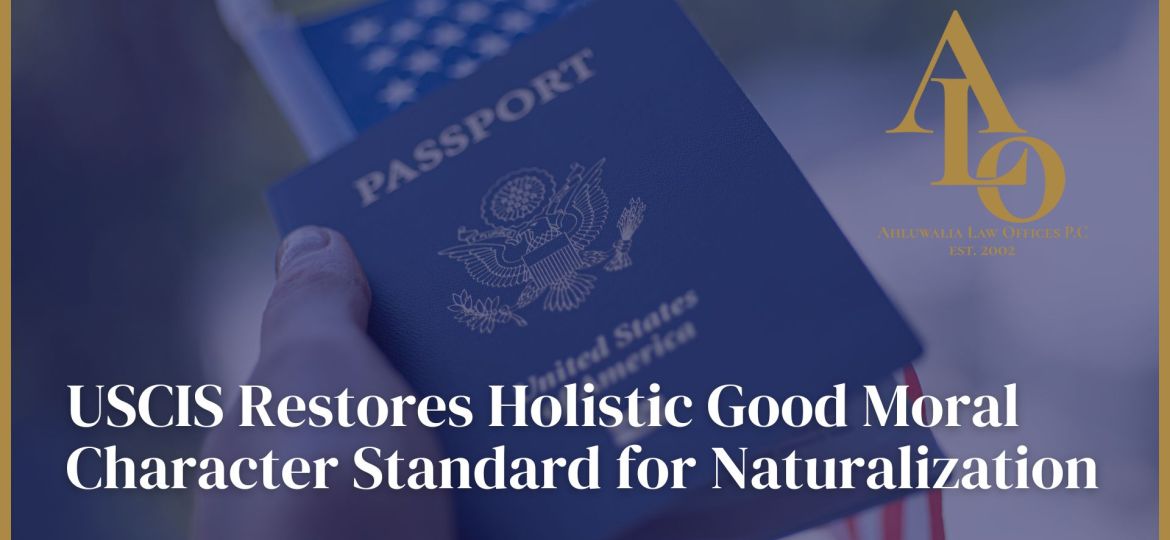
On August 15, 2025, U.S. Citizenship and Immigration Services (USCIS) issued new policy guidance reaffirming a rigorous and holistic approach to evaluating good moral character (GMC) for foreign nationals seeking U.S. citizenship through naturalization. This memorandum marks a return to the traditional “totality of the circumstances” standard under section 101(f) of the Immigration and Nationality Act (INA), ensuring that naturalization applicants are judged not only on the absence of misconduct but also on their positive contributions to American society.
Why Good Moral Character Matters in Naturalization
Naturalization is more than an immigration benefit—it is a profound legal transformation that grants full rights and responsibilities of U.S. citizenship. One of the statutory requirements under INA §316(a)(3) is that an applicant must demonstrate that they “have been and still are a person of good moral character” during the statutory period, typically the five years prior to filing (or three years for certain applicants).
USCIS officers now must weigh both adverse and favorable evidence when determining GMC. While certain permanent bars—such as murder or aggravated felonies—remain absolute, other conditional factors will be reviewed with consideration of rehabilitation and reform.
Positive Factors USCIS Will Consider
In its new guidance, USCIS emphasized that GMC is not just about avoiding disqualifying conduct but also about affirmatively demonstrating strong moral character. Officers will place weight on:
- Sustained community service and civic contributions.
- Family caregiving and responsibilities.
- Educational achievements and personal growth.
- Steady employment and financial responsibility.
- Compliance with tax obligations.
- Length of lawful residence in the United States.
These elements align GMC with the standards of “average citizens of the community,” reflecting an expectation of active and responsible participation in U.S. life.
Conduct That May Disqualify Applicants
Certain behaviors remain grounds for denial of naturalization. These include:
- Permanent bars: murder, aggravated felonies, crimes of violence, genocide, torture, and persecution.
- Conditional bars: drug-related offenses, multiple DUI convictions, false claims to U.S. citizenship, unlawful voting, and other statutory offenses.
- Other acts: habitual reckless driving, aggressive harassment, or conduct inconsistent with civic norms—even if technically lawful.
USCIS officers will review all available documentation and may question applicants about past incidents to determine whether they rise to the level of disqualifying conduct.
Rehabilitation and Reformation as Key Considerations
Importantly, the new policy acknowledges that individuals who have made mistakes may demonstrate rehabilitation. Positive evidence may include:
- Rectifying overdue taxes or child support.
- Completing probation or court-ordered programs.
- Credible community testimony of reformation.
- Repayment of government overpayments or benefits.
- Volunteering, mentoring, or otherwise contributing to the community.
This approach empowers applicants to present their full story and affirmatively prove they are worthy of U.S. citizenship despite prior difficulties.
What This Means for Naturalization Applicants
For foreign nationals and lawful permanent residents pursuing U.S. citizenship, this policy shift underscores the importance of preparation. Applicants should be ready to provide comprehensive evidence of their positive contributions and, where applicable, proof of rehabilitation.
At Ahluwalia Law Offices, we guide clients through every step of the naturalization process, ensuring that their application highlights both eligibility and good moral character under USCIS’s strengthened standard.

